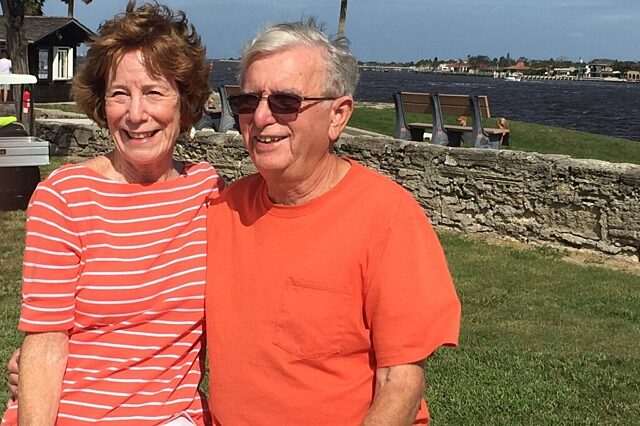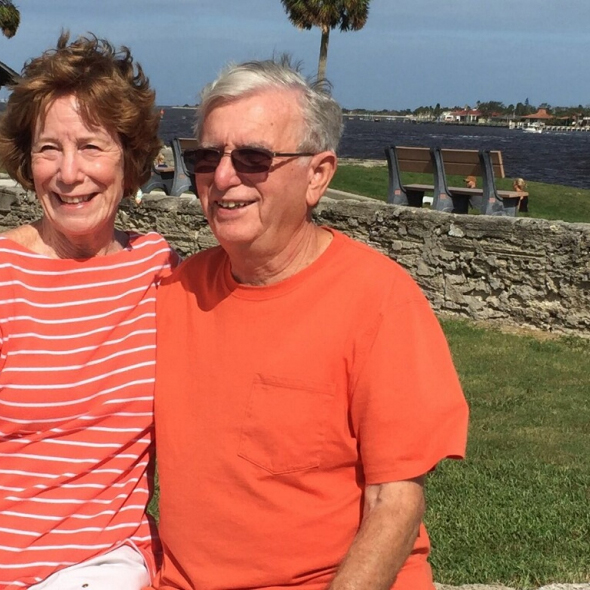Bladder Cancer – Susan’s Road to Acceptance


It was late December when Susan Baglivio, a 68-year-old outpatient surgery nurse from St. Augustine, felt that she may have a urinary tract infection, or UTI. She had frequent urination and felt like she was sitting on a lump.
“I’d never had a UTI my whole life, and it just seemed like I had one,” she said.
Susan went to see her gynecologist and was given antibiotics. Her problems continued to get worse and the day after Christmas, she couldn’t tolerate the pain any longer. She went to the E.R., where an examination revealed a mass that was diagnosed as bladder cancer.
Paul Crispen, M.D., a urologic oncologist, treated Susan. “While most patients present with blood in the urine, her initial presentation was caused by pain and urinary frequency,” said Crispen, an associate professor in UF College of Medicine’s urology department.
Thankfully, Susan’s CT scans did not show evidence that the cancer had spread beyond her bladder and left ureter. Her options included surgery and chemotherapy, alone or in combination with one another.
“I didn’t want to have chemotherapy,” said Susan. “When I met with Dr. Crispen I realized I had no choice, my tumor was fast growing.”
Because of the location and stage of her cancer, she was told her best chance for cure was the surgical removal of her bladder and left kidney following chemotherapy.
“The urologist said everything’s going to have to come out,” she recounted. “I went into shock. I didn’t know I was going to lose my bladder.”
Post-treatment was a difficult road for Susan, who now has a urostomy bag that collects her urine. She’s tried to make the best of the tough situation.
“My last name is Baglivio and now I go by Susie Bags because I wear a bag,” she said. “I tried so many different brands of bags, and after surgery I was dealing with urinary tract infections. It took me months to accept what I was going through.”
Urinary tract infections can be common after bladder removal surgery, largely due to the new urinary drainage system required for urine to leave the body.
“The best advice for someone diagnosed with bladder cancer is to make sure you know all of your options,” said Crispen. “I encourage patients to ask open questions to their care providers and participate in bladder cancer advocacy groups locally and nationally. Shelly Doran, a genitourinary oncology nurse navigator, has set up a local support group for patients at UF Health. Additionally, the Bladder Cancer Advocacy Network is an excellent organization that provides a wealth of resources to patients. In terms of treatment, I encourage patients to consider clinical trials, which offer our patients the latest breakthroughs in the treatment of bladder cancer.”
Now, Susan connects with her patients who are going through the same treatment.
“I interview patients before they have surgery now in preadmission, and if I have someone who might be going through the same procedure, I’ll say, ‘If this should happen to you, call me, and I will offer all of my assistance’, because that will make it all worthwhile,” she said.
May is Bladder Cancer Awareness Month. In the U.S., bladder cancer is the fourth most common cancer for men and the 11th most common cancer for women. There are multiple known risk factors for bladder cancer including exposure to specific chemicals, medications and infections. However, the number one risk factor for developing bladder cancer is smoking. Some patients develop bladder cancer without any obvious risk factors, like Susan.
This month, we reflect on stories like Susan’s and aim to increase awareness of bladder cancer.